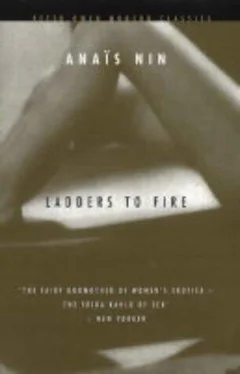Anaïs Nin - Ladders to Fire
Здесь есть возможность читать онлайн «Anaïs Nin - Ladders to Fire» весь текст электронной книги совершенно бесплатно (целиком полную версию без сокращений). В некоторых случаях можно слушать аудио, скачать через торрент в формате fb2 и присутствует краткое содержание. Год выпуска: 2004, ISBN: 2004, Издательство: Peter Owen Limited, Жанр: Классическая проза, Эротические любовные романы, на английском языке. Описание произведения, (предисловие) а так же отзывы посетителей доступны на портале библиотеки ЛибКат.
- Название:Ladders to Fire
- Автор:
- Издательство:Peter Owen Limited
- Жанр:
- Год:2004
- ISBN:9780720611625
- Рейтинг книги:5 / 5. Голосов: 1
-
Избранное:Добавить в избранное
- Отзывы:
-
Ваша оценка:
- 100
- 1
- 2
- 3
- 4
- 5
Ladders to Fire: краткое содержание, описание и аннотация
Предлагаем к чтению аннотацию, описание, краткое содержание или предисловие (зависит от того, что написал сам автор книги «Ladders to Fire»). Если вы не нашли необходимую информацию о книге — напишите в комментариях, мы постараемся отыскать её.
Cities of the Interior
Children of the Albatross
The Four-Chambered Heart
A Spy in the House of Love
Solar Barque
Ladders to Fire — читать онлайн бесплатно полную книгу (весь текст) целиком
Ниже представлен текст книги, разбитый по страницам. Система сохранения места последней прочитанной страницы, позволяет с удобством читать онлайн бесплатно книгу «Ladders to Fire», без необходимости каждый раз заново искать на чём Вы остановились. Поставьте закладку, и сможете в любой момент перейти на страницу, на которой закончили чтение.
Интервал:
Закладка:
Lillian did not know then that the one who believes he can pay this early debt meets a bottomless well. Because the first denial has set off a fatality of revenge which no amount of giving can placate. Present in every child and criminal is this conviction that no retribution will repair the injury done. The man who was once starved may revenge himself upon the world not by stealing just once, or by stealing only what he needs, but by taking from the world an endless toll in payment of something irreplaceable, which i the lost faith.
This diminutive Jay who appeared in the darkness when he evoked his childhood was also a personage who could come nearer to her own frightened self without hurting her than the assertive, rather ruthless Jay who appeared in the daytime when he resumed his man’s life. When he described his smallness and how he could entersaloons to call for his father without having to swing the doors open, it seemed to Lillian that she could encompass this small figure better in the range of her vision than the reckless, amorphous, protean Jay whose personality flowed into so many channels like swift mercury.
When Jay described the vehemence, the wildness, the hunger with which he went out into the streets to play, it seemed to her that he was simultaneously describing and explaining the vehemence, the hunger, the wildness with which he went out at night now and left her alone, so that the present became strangely innocent in her mind.
When he talked about his impulses towards other women he took on the expression not of a man who had enjoyed another woman sensually, but of a gay, irrepressible child whose acts were absolutely uncontrollable; it became no longer infidelity but a childish, desperate eagerness to “go to the street and play.”
She saw him in the present as the same child needing to boast of his conquests out of a feeling of helplessness, needing to be admired, to win many friends, and thus she attenuated in herself the anxiety she experienced at his many far-flung departures from her.
When she rebelled at times he looked completely baffled by her rebellions, as if there were nothing in his acts which could harm her. She always ended by feeling guilty: he had given her his entire self to love, including the child, and now, out of noblesse oblige, she could not possibly act…like his harsh mother!
He looked at the sulphur-colored Pernod and drank it.
He was in the mood to paint his self-portrait for anyone who wanted to listen: this always happened after someonehad attacked his painting, or claimed some overdue debt.
So Jay drank Pernod and explained: “I’m like Buddha who chose to live in poverty. I abandoned my first wife and child for a religious life. I now depend on the bowl of rice given to me by my followers.”
“What do you teach?” asked a young man who was not susceptible to the contagion of Jay’s gaiety.
“A life from which all suffering is absent.”
But to the onlooker who saw them together, Lillian, ever alert to deflect the blows which might strike at him, it seemed much more as if Jay had merely unburdened all sadnesses upon her rather than as if he had found a secret for eliminating them altogether. His disciples inevitably discovered they, too, must find themselves a Lillian to achieve his way of life.
“I’m no teacher,” said Jay. “I’m just a happy man. I can’t explain how I arr his entirt such a state.” He pounded his chest with delight. “Give me a bowl of rice and I will make you as joyous as I am.”
This always brought an invitation to dinner.
“Nothing to worry about,” he always said to Lillian. “Someone will always invite me to dinner.”
In return for the dinner Jay took them on a guided tour of his way of life. Whoever did not catch his mood could go overboard. He was no initiator. Let others learn by osmosis!
But this was only one of his self-portraits. There were other days when he did not like to present himself as a laughing man who communicated irresponsibility and guiltlessness, but as the great barbarian. In this mood he exulted the warrior, the invaders, the pillagers, the rapers. He believed in violence. He saw himself as Attila avenging the impurities of the world by bloodshed. He saw his paintings then as a kind of bomb.
As he talked he became irritated with the young man who had asked him what he taught, for Jay noticed that he walked back and forth constantly but not the whole length of the studio. He would take five long steps, stop mechanically, and turn back like an automaton. The nervous compulsion disturbed Jay and he stopped him: “I wish you’d sit down.”
“Excuse me, I’m really sorry,” he said, stopping dead. A look of anxiety came to his face. “You see, I’ve just come out of jail. In jail I could only walk five steps, no more. Now when I’m in a large room, it disturbs me. I want to explore it, familiarize myself with it, at the same time I feel compelled to walk no further.”
“You make me think of a friend I had,” said Jay, “who was very poor and a damned good painter and of the way he escaped from his narrow life. He was living at the Impasse Rouet, and as you know probably, that’s the last step before you land at the Hospital, the Insane Asylum or the Cemetery. He lived in one of those houses set far back into a courtyard, full of studios as bare as cells. There was no heat in the house and most of the windows were cracked and let the wind blow through. Those who owned stoves, for the most part, didn’t own any coal. Peter’s studio had an additional anomaly: it had no windows, only a transom. The door opened directly on the courtyard. He had no stove, a cot whose springs showed through the gored mattress. No sheets, and only one old blanket. No doorbell, of course. No electricity, as he couldn’t pay the bill. He used candles, and when he had no money for candles he got fat from the butcher and burnt it. The concierge was like an old octopus, reaching everywhere at once with her man’s voice and inquisitive whiskers. Peter was threatened with eviction when he hit upon an idea. Every year, as you know, foreign governments issued prizes for the best painting, the best sculpture. Peter got one of the descriptive pamphlets from the Dutch embassy where he had a friend. He brought it to the concierge and read it to her, then explained: Fact one: he was the only Dutch painter in Paris. Fact two: a prize would be given to the best painting produced by a Dutchman, amounting to half a million francs. The concierge was smart enough to see the point. She agreed to let the rent slide for a month, to lend him money for paints and a little extra change for cigarettes while he painted something as big as the wall of his cell. In return, with the prize money, he promised to buy her a little house in the country for her old age—with garden. Now he could paint all day. It was spring; he left his door open and the concierge settled in the courtyard with her heavy red hands at rest on her lap and thought that each brush stroke added to her house and garden. After two months she got impatient. He was still painting, but he was also eating, smoking cigarettes, drinking aperitifs and even sleeping at times more than eight hours. Peter rushed to the embassy and asked his friend to pay him an official call. The friend managed to borrow the official car with the Dutch coat of arms and paid the painter a respectful visit. This reassured her for another month. Every evening they read the booklet together: ‘the prize will be handed over in cash one week after the jury decides upon its value…’ The concierge’s beatitude was contagious. The entire house benefited from her mellowness. Until one morning when the newspapers published the name and photograph of the genuine Dutch painter who had actually won the prize and then without warning she turned into a cyclone. Peter’s door was locked. She climbed on a chair to look through the transom to make sure he was not asleep or drunk. To her great horror she saw a body hanging from the ceiling. He had hanged himself! She called for help. The police forced the door open. What they cut down was a mannequin of wax and old rags, carefully painted by Peter.
Читать дальшеИнтервал:
Закладка:
Похожие книги на «Ladders to Fire»
Представляем Вашему вниманию похожие книги на «Ladders to Fire» списком для выбора. Мы отобрали схожую по названию и смыслу литературу в надежде предоставить читателям больше вариантов отыскать новые, интересные, ещё непрочитанные произведения.
Обсуждение, отзывы о книге «Ladders to Fire» и просто собственные мнения читателей. Оставьте ваши комментарии, напишите, что Вы думаете о произведении, его смысле или главных героях. Укажите что конкретно понравилось, а что нет, и почему Вы так считаете.












